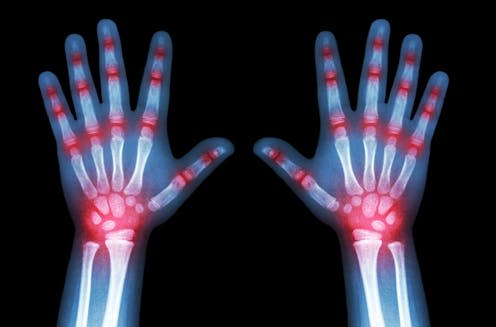Children get arthitis too, with life-changing effects – but exercise can help

Arthritis is usually associated with older people but kids can suffer too. Juvenile idiopathic arthritis (JIA) is the most common type of arthritis in children. It affects about about 1 in 1,000 kids under 16 in the UK (roughly 15,000 children), and causes joint pain and inflammation in the hands, knees, ankles, elbows and wrists – although it can affect other body parts, too.
There’s no cure for JIA. Pain can be managed through treatments to ease symptoms, reduce pain and swelling, and prevent joint damage. Medications such as immunosuppressant methotrexate and biological medicine etanercept are widely used. But these treatments can have side effects, such as decreasing ability to fight infection.
Physical activity is essential for kids with juvenile idiopathic arthritis, but sometimes there’s worry it might make their symptoms worse. This condition can cause joint pain, stiffness, and weak muscles, which might stop children from being active. Yet even with these challenges, exercise is beneficial for children with JIA.
JIA isn’t just a physical issue. It affects social connections and future independence, requiring more than medical care. Teens with JIA struggle more than their peers, bringing extra difficulties with school, career choices, staying active, and social development.
How arthritis leaves kids isolated
In particular, JIA students struggle with attendance and participation. They may need to avoid some physical activities, which can leave them feeling isolated and impact their studies.
Schools can support them with tailored programs that address their needs, helping them manage their illness and stay engaged in school. This support is vital for their educational success and future career prospects, but missing school and activities can still hinder their achievements.
If the teenage years are not handled well, it can affect their work life later on. They might find themselves missing work often, struggling to focus while at work, or facing disabilities that make working difficult.
JIA changes over time, which can also make work more difficult. Some people might see their symptoms improve and go into remission, while others might deal with ongoing disability. This uncertainty makes planning for the future and finding the right job even more challenging.
It’s essential, then, to help these young people manage their illness and support their mental and social needs at an early stage.
Physical Activity
One thing that can make a difference is enabling them to take part in physical activity. Lack of activity can lead to weak bones and a lower quality of life whereas appropriate exercise can help make children’s bones stronger, build muscle, improve their ability to exercise, and make them feel better overall. Experts suggest children with JIA should try to be active for 60 minutes a day in a way that suits their health and symptoms.
JIA doesn’t have to preclude taking part in sports, as demonstrated by professional golfer Kristy McPherson and American football star Charcandrick West who forged careers as elite athletes despite the challenges of their condition.
Yet, kids with this condition often do less exercise than their peers, illustrating the need for clear, tailored advice on how children with JIA can exercise safely. This advice should be part of a bigger plan that includes their medical treatment and regular, suitable exercise to help improve their health and avoid future problems.
The problem is low awareness about arthritis in young people can prevent them from getting the support they need to thrive. So it’s crucial for adults in influential roles, like teachers and policymakers – such as politicians and healthcare commissioners – to understand these challenges to improve support for young people with JIA.
Research is underway at the University of Manchester to better understand the impact of various juvenile rheumatic diseases, including JIA, on adolescents and young adults. Our research aims to address some of the unique challenges faced by young people with JIA by informing the development of evidence-based policies that can be implemented by schools, in the work place and government policy to help support the needs of young people with arthritis.
JIA may not always be visible, yet its profound impact on young lives extends far beyond childhood, influencing education, social connections, and future employment. Recognising the full scope of JIA’s effects, alongside ensuring comprehensive support that encompasses both medical and social care, is essential for empowering affected children to navigate their challenges more effectively and lead fulfilling lives.
This article is republished from The Conversation under a Creative Commons license. Read the original article.

Ash Cox receives funding from Nuffield Foundation.

 Yahoo News
Yahoo News 